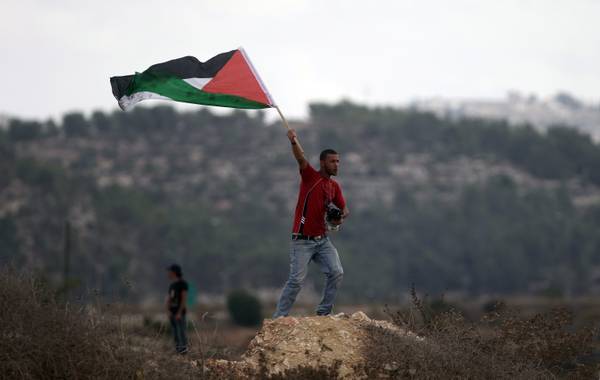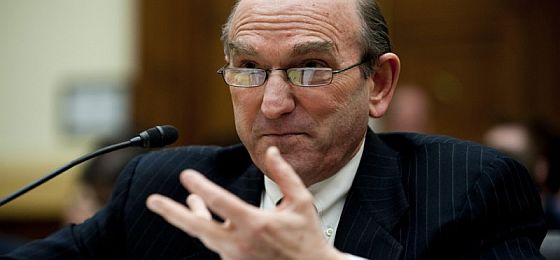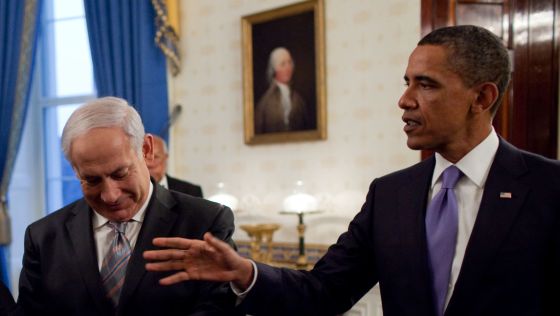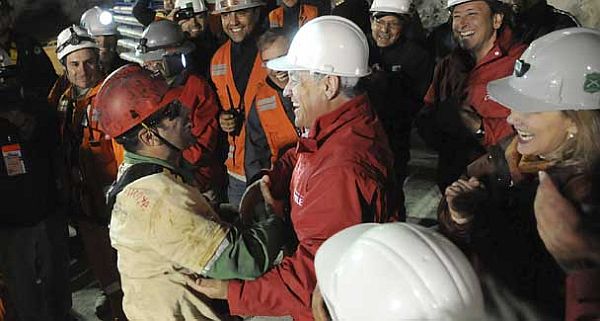
By Mark Perry
On March 24, the Israeli government arrested Bassem Tamimi, a 44-year-old resident of the small Palestinian village of Nabi Saleh, which is just west of Ramallah. Tamimi was arrested for leading a group of his neighbors in protest marches on a settlement that had “expropriated” the village’s spring — the symbolic center of Nabi Saleh’s life.
Tamimi was brought before the Ofer military court and charged with “incitement, organizing unpermitted marches, disobeying the duty to report to questioning” and “obstruction of justice” — for giving young Palestinians advice on how to act under Israeli police interrogation. He was remanded to an Israeli military prison to await a hearing and a trial. The detention of Tamimi is not a formality: under Israeli military decree 101 he is being charged with attempting “verbally or otherwise, to influence public opinion in the Area in a way that may disturb the public peace or public order.” As in Syria, this is an “emergency decree” disguised as protecting public security. It carries a sentence of 10 years.
The arrest of Tamimi marked only the most recent escalation in Israel’s campaign to suffocate the Nabi Saleh movemen: in the two months prior to his arrest, Israeli officials detained more than 18 Nabi Saleh youths; over the last two years, nearly 15 percent of Nabi Saleh’s population has spent time in Israeli jails; half of those arrested have been under the age of 18 and the youngest of them was 11. But what is extraordinary about the Nabi Saleh campaign is its effectiveness. The protestors are trained in non-violent tactics. “Our strategic choice of a popular struggle — as a means to fight the occupation taking over our lands, lives, and future — is a declaration that we do not harm human lives,” Tamimi has said. “The very essence of our activity opposes killing.”
Tamimi’s arrest has not stopped the movement. On the morning of April 8, about 80 villagers marched from Nabi Saleh’s main street towards the settlement. As they crossed into some nearby fields, they were attacked by IDF soldiers with teargas, rubber bullets, and stun grenades. The villagers fled, but then reorganized themselves, defiantly linking arms in front of the soldiers. Again, the IDF responded harshly and, by that evening, had arrested six villagers. But these are small incidents in a continuing battle. The protests go on day after day, week after week — and have over the course of the last four years.
Nabi Saleh does not stand alone. The non-violent protests actually began eight years ago in small communities near Israel’s security wall, then took root in the villages of Mas’ha and Budrus; the protests have now spread to towns and villages across the West Bank, encompassing mass rural movements from Hebron in the south to Nablus in the north. The protests have involved dozens to hundreds, and on rare occasions, thousands of villagers. But pride of place for this widespread non-violent resistance movement belongs to Bil’in, a village that (like Nabi Saleh) has seen much of its land taken over by a settlement. The leader of the Bil’in protests is Abdallah Abu Rahmah, the head of Bil’in’s Popular Committee Against the Wall. Like Tamimi, Abu Rahmah has trained his young activists in the principles of non-violence, sparking movable protests that the IDF has found impossible to suppress.
Abu Rahmah, a high school teacher at the Latin Patriarch School in Ramallah, began organizing Bil’in’s protests in 2004, even as the violence of the Second Intifada was beginning to wane. Every Friday after prayers, Abu Rahmah would lead a group of Bil’in residents on a protest march towards a local settlement — and every Friday his march would be intercepted by the IDF.
In one demonstration, an IDF sniper used a .22 caliber rifle to disburse the protesters, killing a Palestinian boy. Twenty-one unarmed demonstrators, among them five children, have been killed in non-violent West Bank demonstrations since the beginnings of the movement. In the village of Nil’in in 2008, American activist Tristan Anderson was paralyzed after an IDF soldier fired a high velocity tear gas canister at his head from a distance of 15 meters. In December of 2009, IDF soldiers raided Abu Rahmah’s home, arrested him for incitement, and sentenced him to 12 months in prison. At the end of his sentence, the IDF asked his sentence to be extended for another four months, describing Abu Rahmah as “dangerous.” The court agreed.
Abu Rahmah has become a symbol of the protests. While in prison, he smuggled letters to his supporters, including one — written this last February — that has become a kind of “Letter from Birmingham Jail” of the movement. “Ofer is an Israeli military base inside the occupied territories that serves as a prison and military court,” he wrote. “The prison is a collection of tents enclosed by razor wire and an electrical fence, each unit containing four tents, 22 prisoners per tent. Now, in winter, wind and rain comes through the cracks in the tent and we don’t have sufficient blankets, clothes, and other basic necessities. Food is a critical issue here in Ofer, there’s not enough. We survive by buying ingredients from the prison canteen that we prepare for our tent. We have one small hot plate, and this is also our only source of warmth.”
One month after penning this letter, Abu Rahmah was released, but it’s only a matter of time before he’s arrested again — and shut inside one of the half-dozen Israeli military prisons and administrative facilities that dot the West Bank. Israeli tactics, the mass arrests, and the use of live fire have been condemned by a long list of human rights organization. But not by the United States.
Just how much do the Bil’in-Nabi Saleh protests worry Israel? One widely circulated article from the popular Israeli political daily Yediot Ahronot described Naji Tamimi, who helped his cousin Bassem organize the Nabi Saleh movement, as “a pied piper” who “fans the flames of violence.” (Despite the fact that not one Israeli has died as a result of the protests.) The article went further: “Even though it hasn’t been proven, it seems that sources connected to the Palestinian Authority are directing the activities and that the funds paid out to the youths is coming from donations from organizations registered abroad.” Not proven — because it’s not true. In fact, while Fateh and Hamas officials monitor the protests (PA officials have come to Nabi Saleh — before scuttling back to their offices in Ramallah), they have been careful not to interfere in them. They view the protests as a credible and powerful movement that is better left alone. Hamas leaders agree. “We wish them well. We hope they succeed. We support them. We are staying away,” a senior Hamas official says.
A group of international activists have been helping the Nabi Saleh protests. Jonathan Pollak, a 29-year-old native of Tel Aviv, has found himself at the center of the protests — and has written about them extensively. “I grew up in a progressive home,” he says, “but I don’t think that anyone in my family could be described as a radical. I came to Nabi Saleh and realized I had to help. What’s happening here is just wrong.” Joseph Dana, a New York native and journalist, works alongside Pollak. He came to Israel to find his Jewish identity. “I haven’t found it,” he says. “What I found instead was an army that arrests children.”
Pollak, Dana, and other international activists are working to bring attention to the Nabi Saleh movement and have escorted diplomats from Europe through the village. A few low-level American diplomats from Jerusalem have come to Nabi Saleh, but no senior American officials have visited. “The international community has been asking for years where the Palestinian nonviolent movement is,” Joseph Dana says from his home in Jerusalem. “Well, here it is. And the Americans are nowhere to be found.”
Pollak and Dana are being modest. While the events at Nabi Saleh and Bil’in have been largely ignored in the United States, they have sparked a simmering conflict between Palestinian villagers and Israeli settlers. The IDF has taken the side of the settlers, arresting hundreds of young Palestinians (many of them minors) and using (in one case) the testimony of a 14-year-old boy to condemn the movement’s leadership. “They kept him up all night, shouting at him,” Dana says. “He was frightened, alone. Finally, he did what they wanted. If you can imagine, Israeli soldiers subjecting a child to mental torture.” While the world’s attention has been diverted by the events in Tahrir Square, Israeli officials have struck back against what may well be the greatest threat to their settlement project — condemning non-violent protesters as “terrorists” and standing aside while settlers have taken more and more land from unarmed and defenseless people. Israel has poured increased funds into countering the protests, deployed more and more soldiers to stop them, and escalated the arrest of its leaders — breaking down the doors of their homes in pre-dawn raids designed to frighten and intimidate them. Nothing has worked.
Unfunded and unnoticed, Bassem Tamimi, his cousin Naji, Abdallah Abu Rahmah, and a handful of others have organized and trained battalions of young men and women in the art of non-violent resistance. Bassem Tamimi’s arrest has not stopped the protests. They are growing, and spreading. The movement is now in the hands of Bassem’s wife, Nariman, who vows to fight on. She has already spent time in an Israeli jail, but remains undeterred. “There is no knowing what the future holds,” she says from her home in Nabi Saleh, “but our path is clear and so is our goal. We know well that it is possible to achieve it, and we will continue to fight for it. To a great extent, the question of our victory is also one that should be directed to the American people and their government — are you on the side of justice and victory, or on the side of continued oppression?”
The Arab Spring has seen revolutions come to Tunisia, Egypt, Libya, Yemen, Bahrain, and Syria. In each revolution, U.S. President Barack Obama has praised the crowds seeking democracy and freedom. Again and again he has talked of the need to fight extremist violence. He has paid homage to the young men and women who have brought freedom to Egypt and Tunisia. He has supported those defending themselves in the streets of Benghazi, Sanaa, and Damascus. His talisman has been non-violence, his pole star the American civil rights movement. In Cairo, in June of 2009, President Obama linked the Palestinian quest for freedom to the American civil rights movement. “Palestinians must abandon violence,” he said. “Resistance through violence and killing is wrong and it does not succeed.” He was right. So why is it that now — when finally, Montgomery has come to Nabi Saleh — he chooses to remain silent?
Mark Perry is a military and political analyst and author of eight books, including Partners In Command, George Marshall and Dwight Eisenhower in War and Peace, and most recently Talking To Terrorists.





 As an American, I look at the results of U.S. policies in the Middle East and they remind me of the T-shirt someone once gave me. It said: “Sinatra is dead. Elvis is dead. And me, I don’t feel so good.”
As an American, I look at the results of U.S. policies in the Middle East and they remind me of the T-shirt someone once gave me. It said: “Sinatra is dead. Elvis is dead. And me, I don’t feel so good.”
